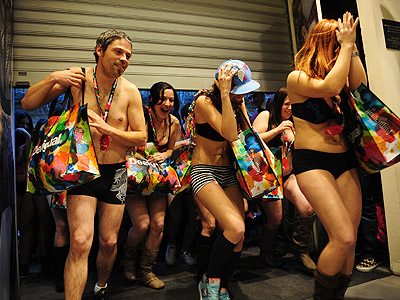
You are careful with your money: you collect all kinds of coupons; look for group-buy deals if you dine out; you don't buy clothes unless in a sale. Does all this make you a shrewd consumer?
你花錢很謹慎:收集各類優惠券,外出就餐找團購,只有在打折時才買衣服。而所有這些真的使你成為一位精明的買家嗎?
Let's do the math first: you walk into a coffee shop and see two deals for a cup of coffee. The first deal offers 33 percent extra coffee. The second takes 33 percent off the regular price. What's the better deal?
我們先來做道數學題:你走進一間咖啡店,看到咖啡有兩種優惠方式。第一種是加量33%;第二種是降價33%。哪種方式更劃算?
Well, they are about the same, you'd think. And you'd be wrong. The deals appear to be equivalent, but in fact, they are different.
好吧,你可能覺得兩者沒什么不同。那么你就錯了。這兩種優惠看似相同,但實際上卻是完全不同。
Here's the math: Let's say the standard coffee is 10 yuan and let's divide the amount of coffee into three portions. That makes about 3.3 yuan per portion.
計算方式如下:讓我們假設咖啡的標價為10元,我們把咖啡份量分成三份。平均每份價格約為3.3元。
The first deal gets you 4 portions for 10 yuan (2.5 yuan per portion) and the second gets you 3 portions of coffee for 6.6 yuan (2.2 yuan per portion) and is therefore a better deal.
通過第一種優惠方式,你花10元錢能買到4份,平均每份2.5元。第二種,你可以花6.6元買到三份,平均每份2.2元,因此第二種優惠更加劃算。
In a new study published by the Journal of Marketing, participants were asked the same question, and most of them chose the first deal, the Atlantic website reported.
《大西洋月刊》網站報道稱,在發表在《市場營銷雜志》上的一項最新研究中,參與者們被問及上述同樣的問題,他們之中的大多數人選擇第一種優惠。
Why? Because getting something extra for free feels better than getting the same for less. The applications of this insight into consumer psychology are huge.
是何原因?因為與低價購買相同事物相比,免費獲得額外加贈感覺更好。而這一見解也被廣泛應用到消費者心理領域之中。
Instead of offering direct discounts, manufacturers or shops offer larger sizes or free samples.
廠商及店家們提供加量裝或免費小樣,而并非直接打折。
According to the study, the reason why these marketing tricks work is that consumers don't really know how much anything should cost, so we rely on parts of our brains that aren't strictly quantitative.
該研究顯示,這些營銷陷阱之所以奏效,原因就在于消費者實在搞不清商品的成本是多少,所以我們就依靠我們大腦中并不嚴格定量的部分來判斷。
There are some pitfalls we should be aware of when shopping. First of all, we are heavily influenced by the first number.
購物時,我們要警惕一些陷阱。首先,我們深受第一眼數字的影響。
Suppose you are in Hong Kong on a shopping spree. You walk into Hermes, and you see a 100,000 yuan bag. “That's crazy.” You shake your head and leave.
假設你在香港血拼。當走進愛馬仕店時,你看到一個標價十萬人民幣的包。“這太瘋狂了。”你搖搖頭,走開了。
The next shop is Gucci, a handbag here costs 25,000 yuan. The price is still steep, but compared to the 100,000 yuan price tag you just committed to your memory, this is a steal. Stores often use the gap in prices to set consumer's expectation.
接下來你來到古馳店,這里的一個手提包價值兩萬五千元。價格依舊令人咋舌,但比起你剛剛印在腦海中的那個十萬元的價格標簽,這實在是便宜。商店經常利用價格差來設定消費者的消費預期。
Another -prey we often fall to is that we are not really sure what things are worth. And so we use cues to tell us what we ought to pay for them.
另外一個讓我們深受其害的陷阱是我們確實不知道商品值多少錢。所以我們利用一些暗示來告訴自己應該花多少錢。
US economist Dan Ariely has done an experiment to prove this. According to the Atlantic, Ariely pretended he was giving a poetry recital.
美國經濟學家丹•阿雷利通過一項實驗證明了這一點。據《大西洋月刊》報道稱,阿雷利謊稱自己將要舉辦詩歌朗誦會。
He told one group of students that the tickets cost money and another group that they would be paid to attend.
他告訴一組學生說門票是收費的,告訴另一組學生說參加活動是有報酬的。
Then he revealed to both groups that the recital was free. The first group was anxious to attend, believing they were getting something of value for free.
然后他再告訴兩組人真相:朗誦會是免費的。第一組人便急于參加,深信他們免費獲得了一些有價值的東西。
The second group mostly declined, believing they were being forced to volunteer for the same event without compensation.
而第二組人大部分都婉拒了,認為他們被迫為同一個事件志愿服務,卻沒有補償。
What's a poetry recital by an economist worth? The students had no idea. That's the point. Do we really know what a shirt is worth? What about a cup of coffee? What's the worth of a life insurance policy? Who knows? Most of us don't.
一位經濟學家的詩歌朗誦會價值幾何呢?學生們并不清楚。這便是關鍵所在。我們真的知道一件襯衫的價值嗎?那么一杯咖啡的價值呢?一張人壽保險單的價值是多少?誰知道?我們大多數人都會搖頭。
As a result, our shopping brain uses only what is knowable: visual clues, triggered emotions, comparisons, and a sense of bargain versus rip-off. We are not stupid. We are just susceptible.
結果,我們的購物大腦只使用那些已知的事物:視覺線索、被激發的情緒、貨比三家,以及便宜貨VS宰人品的較量之感。我們不愚蠢,只是容易受到影響。


